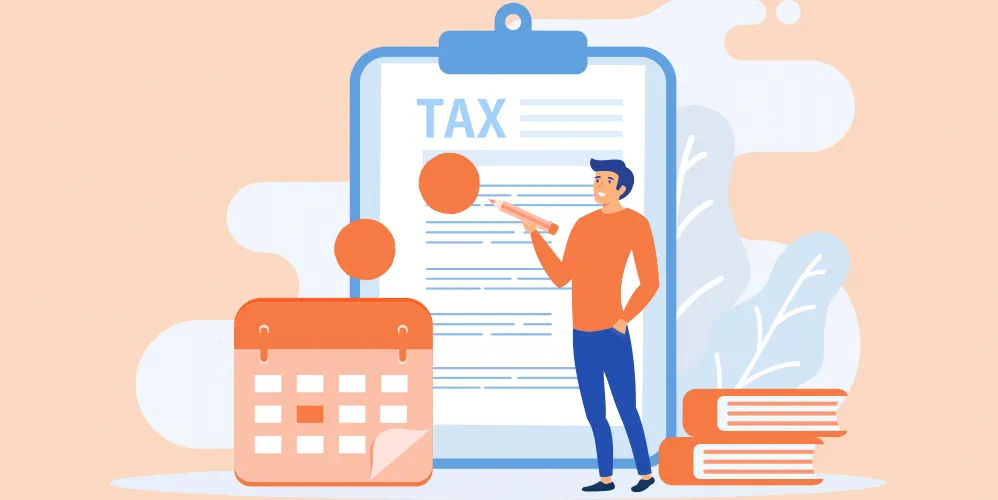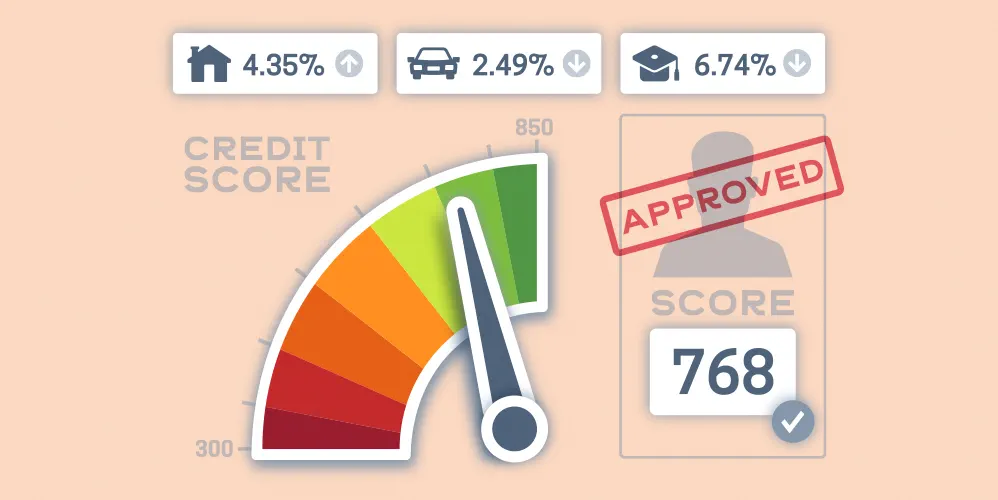
What Is The Ideal Tenure For Car Loan?
10 Feb 2023

Table of Content
Car Loan Tenure – Introduction
The desire for owning a car is gradually growing in India, according to TechSci Research (https://bit.ly/3OT1o5A). The Indian car loan market is poised for a “compounded annual growth rate (CAGR) of over 8 per cent in value terms and will reach USD60 billion by FY2026." A shift from combustion engine vehicles to electric vehicles seems to be the trend.
With the car loan benefits for both types of car loans, more people can be proud owners of new cars or preowned cars. Though car loans are easily available from banks and private Fintech lenders, borrowers need to focus on loans that fit their budget. It is easy to go overboard with loans that are beyond your capacity putting you under undue financial stress and defaults.
Before applying for loans , use an EMI Calculator to determine the loan amount you can pay comfortably, the interest rate offered by the lender and the loan tenure.
These are the most important parameters that must be given special attention. The EMI calculator helps you get the correct estimate for the tenure allowing loan repayment comfortably. You can plan a pay-off without disturbing your regular monthly expenses. Car loan tenure from most banks typically ranges from 1-7 years. The shorter the loan tenure, the higher will be the EMI. In minimum tenure for car loan, you get a faster chance to pay off debt early. The maximum tenure for a car loan keeps you in debt longer, however, the EMIs will be less, with overall higher interest.
Why Should You Decide On Car Loan Tenure Wisely?
The car loan tenure influences the EMI (Equated Monthly Instalment)
The maximum tenure for car loans increases the interest outgo
Lenders levy higher interest rates on long-tenure loans compensating additional credit risks taken by them
Minimum tenure for a car loan increases the monthly EMI but allows you to go debt-free faster
For example: Let us understand this better.
Using the Bank of Baroda Car Loan EMI Calculator as an example will help.
When choosing a car loan for ₹10 lakhs for 36 months at a rate of interest of 8% you will pay ₹31,336.
Increase the tenure to 60 months, the EMI decreases to ₹20,276
The longer tenure is bringing down the EMI, but the interest cost is being added to the loan. A smart borrower, therefore, checks the best term suitable to them.
When budgeting your monthly expenses, if you are planning to repay loans, tight management works to your advantage.
Try to take out a monthly surplus from regular expenses. Clamp the outgoing, where there is an option. Investments side by side with the loan can get tricky. So, you need to balance both, while controlling the monthly budget.
Your income has a lot to do with your EMI payback capacity. If you are expecting a promotion with financial gains, that could affect your payment tenure.
If one of your investments is maturing, the surplus you can set aside to make a pre-payment. That will lessen the loan repayment tenure and decrease the burden from your EMI.
Maximum Tenure for Car Loan
Car loans offer an option to repay over several timelines. You could choose a minimum timeline or a maximum tenure to pay off. Longer car loan repayment terms come with a set of pros and cons.
Let us regard the pros of longer repayment terms:
a) Lower monthly expense
Your monthly payment of EMI is low adding less stress on the monthly expenses. The EMI tenure is dependent on the monthly income of an individual. A person seeking a car loan can have several monthly payment obligations like household expenses. Paying higher EMIs can be an added stress.
b) Banks offer repayment flexibility
If a borrower selects longer repayment terms, it does not mean that they cannot pre-pay the loan or foreclose minimising the loan tenure. However, this is not as easy as it sounds. The individual must have enough extra funds for car loan pre-payment or enough funds for foreclosure. Both pre-payment and foreclosures are charged by most banks. Losing on the interest rate, banks try to compensate for lost interest with a penalty.
c) Less monthly burden
If EMIs are low, the monthly expenses can be adjusted accordingly. The extra cash that you set aside from your income can be invested in mutual funds or alternative investments .
Let us go through the cons of opting for maximum loan payment tenure:
a. Added interest charges over time
By stretching the loan tenure to 5 years instead of 3, the loan interest compounds. Using the earlier example, where the loan principal amount is ₹10 lakhs at 8% If you pay it off over three years, you will pay a total interest of ₹1,28,109. But if you pay it off over five years, your total interest cost will increase to ₹2,16,583. Your longer repayment term makes your loan almost ₹88,474 more expensive.
b. Longer periods of debt
Maximum loan tenure stretches the loan period which means that it takes more time for you to be debt free and apply for a fresh loan. Longer term increase CIBIL score for car loan , making it possible for you to get another loan unless your loan repayment has defaulted.
Minimum Tenure for Car Loan
Minimum tenure for car loan could be anything between 1-3 years. Short-term repayment depends on the financial capacity of the borrower. Being able to pay high EMIs demands high income and if it is difficult, the borrower must never regard this option. If they can, it would mean high monthly EMIs till the loan tenure with high-interest rates. Let us go through the pros and cons of short-term loan tenure.
Pros of minimum tenure for car loan
- Short-term car loans meet with easy approval from the lender. Borrowers pledging to repay in short term, get their loans faster with a minimum wait time.
- Though the credit score is important, for short-term loan repayment, the lender may be a bit lenient on the score and regard other factors with more interest such as income and repayment capacity etc.
Cons of minimum tenure for car loan
Short-term repayment entails a huge degree of pressure on the borrower. Repayment without a single default is not easy. In case the borrower is not able to meet the payment timely they incur a penalty that further burdens the EMI, upsetting the monthly budgeting.
- Pay high-interest rates
In the short term, lenders add maximum interest on the car loan. For example, on a loan amount of ₹10,00,000, with repayment tenure set for 24 months at 8% interest, the monthly EMI is ₹45,227 and the total interest will be ₹85,454.
- Debt-free faster
Though the EMI figure is frightening for those not earning enough, for those who can, it allows them to go debt free faster, giving them greater freedom. After the car loan is repaid, they can apply for another loan or go for an investment.
- Early repayment discounts
Some lenders attach discounts on early repayment for those paying back faster and can make car loans available at reduced interest rates. However, this solely depends on the lender and those offering the same may have more clauses in the fine print. Carefully read the terms and conditions.
- If unsure of repayment, never opt for short-term car loans
The financial risk in short-term car loans is huge. Unless you are completely sure of the repayment capacity avoid this option. It is better to go for long-term loan repayment and make pre-payments from time to time. If the opportunity of disposable surplus cash arises you can also make a foreclosure. However, if you are unable to repay the short-term loan in the scheduled period, your debts keep adding to every missed payment.
- Short-term car loans strengthen CIBIL score
If you can meet the short-term loan period, your CIBIL score will increase and the bank's trust in you will grow to enable easy acceptance for future loans.
Long-Term Vs Short Term Tenure: Which One Is Better
After regarding both options of maximum and minimum tenure for car loan pros and cons, it becomes easier to differentiate between the two. Car loans are for a maximum period of 84 months or 7 years. Therefore, repayment must happen within this short span. Some like the shorter term. Individuals with high-income capacity can opt for short repayment terms on loan values of as high as ₹5 crores. Loans ranging from this amount to as low as ₹10,000 are offered by vendors on new or preowned types of cars. The EMI is compounded by the interest rate applied by the lender throughout the loan. If the loan is short term, the EMI increases, if longer the EMI will be less within the term. Therefore, choosing the tenure depends on the borrower’s affordability and loan management mechanisms. It is difficult to state which is better as what applies to one may not apply to the other. However, if there is any doubt about high built-up repayment, choosing long-term repayment of 7 years could be a better option. Even better if you can add a few pre-payments, reducing the loan burden.
| Factors | Short-Term Car Loan | Long-Term Car Loan |
| Tenure | Minimum tenure for car loan is anything from 1- 7 years | Maximum loan repayment car loans tenures in for 7 years |
| Debt Period | Faster freedom from debt, own your car faster | Car will be hypothecated by lender until debt clears |
| Rate of Interest | Interest rate is high in short term as lenders compensate the short term of loaning with high interest | Total interest is more but spread over till term end in low EMI |
| EMI | EMI amount is on the higher side, with the paid total interest lower than long term | EMI payment is on the lower side, but total spend on interest is high due to the longer tenure |
| Processing & Disbursement Time | Banks verify car loan documents and check profile details with credit score and eligibility then disburse the amount to the applicant's bank account. All this takes place within 1-5 days regardless of tenure. | Banks verify car loan documents and check profile details with credit score and eligibility then disburse the amount to the applicant's bank account. All this takes place within 1-5 days regardless of tenure. |
Ideal Car Loan Tenure
The car loan tenure is mostly based on an individual's loan tolerance capacity. Car loans are in a way short-term loans, therefore as suggested earlier, a Bank of Baroda car loan EMI calculator will help you plan repayment better. Managing repayment is up to the individual. When you are planning on purchasing a car you are not doing it without a financial backup. If you have a part of the cash that can be used as a pre-payment amount, going for short-term car loans makes sense. If you can draw a foreclosure with plans of closing the loan within a couple of years, that too is a planned way of dealing with minimum tenure for car loan. However, one must be mindful of the penalty accrued by some lenders. Choose a lender that does not add a penalty on prepayment or foreclosure.
However, if the burden of monthly EMI that short-term loans get problematic, choosing a long-term, anytime within 7 years would be wise. The monthly pay out would be reduced compared to short-term loans. But do not forget that the maximum tenure for car loan is not more than 7 years, so instead of paying high EMIs over the term, have a pre-payment or foreclosure plan ready. Try to close the loan within 5 years, that will help you gain a bit on the interest and prepare you for other loan options.
Factors to Consider Before Choosing a Car Loan Tenure
If a car is on your wish list, it will be smart to consider these factors before applying for a loan:
- The interest rate
Car loan interest rate differs between lenders. While many lenders will offer unimaginably low-interest rates and you may be tempted to choose them, don't do so without complete research. Car loan interest rates keep changing and doing a thorough research will help you decide on a vendor you can trust with the most comfortable rate.
- Credit Score
A high credit score will earn you attractive interest rates. Check your credit score so that you can negotiate with the lender. If the credit score is low, take corrective actions to improve it. With an improved credit score, you can build a better CIBIL score for future loans.
- Loan Tenure
The loan repayment tenure is proportional to your repayment capacity. Remember, short-term loan repayment demands a high EMI. Long-term repayment is also limited to 7 years. Whichever suits the borrower must be chosen. Those requiring both tenures must fit the bank's eligibility norms.
- Loan charges
Lenders that may charge low-interest rates could charge a higher processing fee along with associated charges with the loan. Thus, before choosing the vendor ensure you check all terms and conditions so that you do not end up paying more than you expect.
- Flexibility in repayment
If you are looking for a prepayment or pre-closure option, remember some lenders levy penalties on these. Choosing a lender that allows pre-payment and foreclosure without added charges makes greater sense.
- Processing time
Most lenders follow minimum documentation on car loans. Ensure that the lender offers loan details online so that you do not have to visit the bank for information. Also, loan processing varies from lender to lender. Some do it in a matter of days while others take days on service and processing. Choose lenders who optimise the procedure.
- Eligibility and down payment
Loan eligibility differs between lenders. Check the car loan eligibility norms and down payment required. Also, know how much a loan can be sanctioned for new or preowned cars. Some offer up to 90%-75% respectively on car loans.
- Read the agreement carefully
Loan agreements should be read carefully as there may be more written than told by your lender. It is better to discover, the untold at the beginning than to learn about it once the car loan repayment takes off. Carefully look at the interest rates, processing charges, pre-payment, and foreclosure charges.
- Other ways of getting a car loan
Sometimes applicants fail to meet the loan eligibility criteria set by the bank. However, banks offer alternatives with other collaterals like FDs, gold, house etc. Borrowers can work out an understanding with the bank.
- Does the lender have a tie-up with the car company?
Before you finalise a car loan, check if the lender has a tie-up with a car company. These come with attractive interest and other perks making your car loan journey smoother.
Best Car Loan Tenure at BOB
When it comes to applying for a car loan, there is a good reason for choosing the Bank of Baroda as your preferred lender.
- Bank of Baroda offers one of the best rates for car loans as compared to other lenders.
- Applicants can opt for both short-term and loan term loan tenure.
- The maximum tenure for car loan in the Bank of Baroda is for 84 months or 7 years.
- Applicants can get loans for both new and pre-owned cars. 90%-75% of the loan is financed by the bank. On-road price includes invoice price, road tax, cost of registration and insurance.
- Bank of Baroda calculates interest on a daily reducing balance, there is no pre-payment penalty or foreclosure charges and no advance EMI to be paid.
- The bank follows a minimum documentation process.
- Salaried and self-employed individuals can opt for the loan. Follow the bank's eligibility criteria and choose Bank of Baroda as your car loan partner.
Popular Articles
-
Disclaimer
The contents of this article/infographic/picture/video are meant solely for information purposes and do not necessarily reflect the views of Bank of Baroda. The contents are generic in nature and for informational purposes only. It is not a substitute for specific advice in your own circumstances. Bank of Baroda and/ or its Affiliates and its subsidiaries make no representation as to the accuracy; completeness or reliability of any information contained herein or otherwise provided and hereby disclaim any liability with regard to the same. The information is subject to updation, completion, revision, verification and amendment and the same may change materially. The information is not intended for distribution or use by any person in any jurisdiction where such distribution or use would be contrary to law or regulation or would subject Bank of Baroda or its affiliates to any licensing or registration requirements. Bank of Baroda shall not be responsible for any direct/indirect loss or liability incurred by the reader for taking any financial decisions based on the contents and information mentioned. Please consult your financial advisor before making any financial decision.











